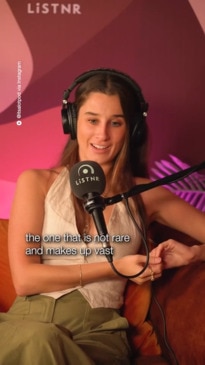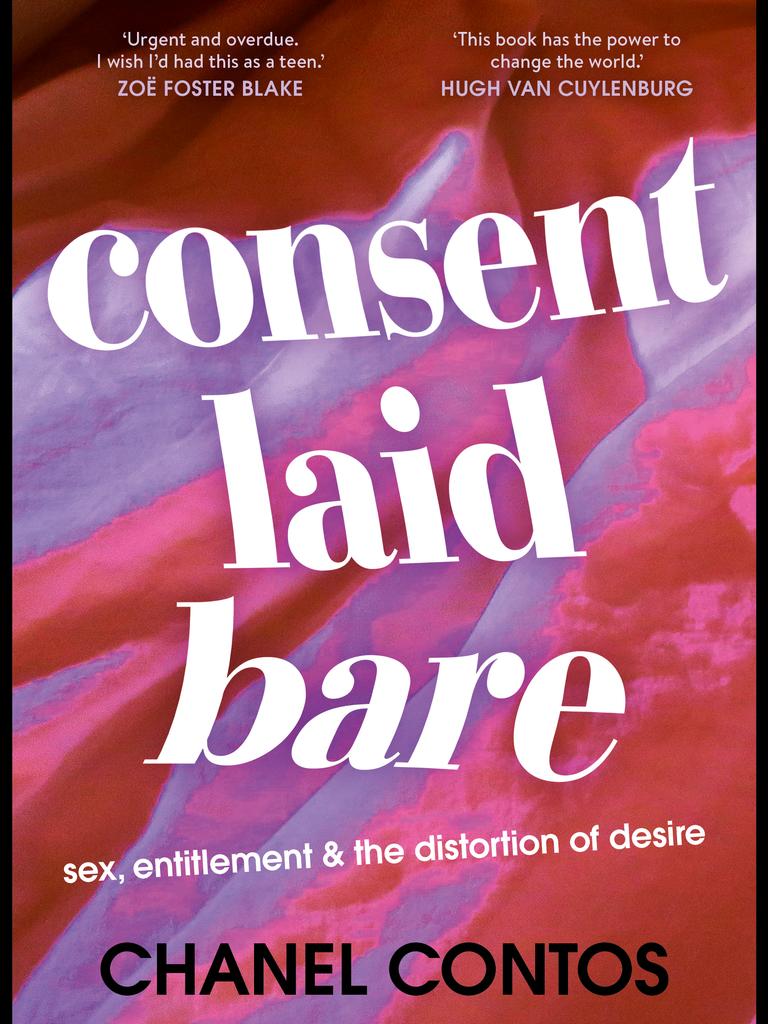‘Would literally change the world’: Chanel Contos on why we need to close the empathy gap
It’s the quality we still fail to instil in our young men – and one that, if encouraged, Chanel Contos says “would literally change the world”.

Early in Consent Laid Bare: Sex, Entitlement & the Distortion of Desire, Chanel Contos quotes from a 2005 commencement speech given by the novelist David Foster Wallace.
“There are these two young fish swimming along and they happen to meet an older fish swimming the other way, who nods at them and says, ‘Morning, boys. How’s the water?’” Foster Wallace told the graduating class of Ohio’s Kenyon College.
“And the two young fish swim on for a bit, and then eventually one of them looks over at the other and goes, ‘What the hell is water?’”
Contos found the fable so reflective of our society, she considered calling her book, “The Water We Swim In”. Because, as she explores in Consent Laid Bare (Macmillan Australia) – the title she ultimately landed on – for the majority of young people “the water we swim in” instils a shocking sense of entitlement in young boys that prioritises what they deserve, and dictates what girls are obligated to give them. It considers pornography an adequate form of sex education, and allows for sexual assault to continue, generation after generation, so that it is more likely for a woman over the age of 15 in Australia to be raped than it is for her to smoke.
What it shows, Contos says, is that “sometimes the most obvious and important realities are the hardest to see”.

To understand “how so many rapists can be our sons, our brothers, and our fathers”, in Consent Laid Bare Contos focuses on what she calls the “entitled opportunist rapist” – the type of boy she grew up with in the milieu of Sydney’s elite, often single-sex private schools.
“There is a relationship between attributes that our society rewards through career progression and the type of attributes that would make a young boy commit sexual assault without being aware that he had done anything wrong,” she explains.
“They’re assertive, they’re popular, they like power and they often feel the need to instantiate their masculinity, usually because they feel insecure about it.”
They are also “unlikely to reoffend if they are held accountable for their actions or taught explicitly what consent is”.

While there is nothing problematic about masculinity, Contos tells news.com.au, the mainstream form of it being encouraged in schools and depicted in the media is of the “toxic” variety. And it is in this “culture, that is first and foremost oppressive to men” an epidemic of male sexual entitlement is able to flourish, due to an emphasis on three key things.
“[The first is] this idea of being physically intimidating – whether that’s being tall, expectations to be fit, expectations to win fights, to play sport,” she says.
“There’s then a disproportionate burden on wealth, and expectations of men to be wealthy and this idea of them being the providers – which upholds a lot of gendered norms, and also can often lead to ideas of entitlement to women’s bodies.
“And then the third one is sexual activity – or sexual conquests, is what I call it in my book – because the pressure for men to be sexually active frequently, and with multiple women, is very present.”
These “core values”, when promoted in an environment like an all-boys school, Contos says, enable toxic masculinity to “breed”.
“And I think single-sex environments can very much ‘other’ the opposite sex. It dehumanises them,” she says.
“It makes it very easy for women to be sex objects when the only time you interact with them is on Saturday night, and there’s all of these expectations to have something to talk about come Monday morning.”
At the crux of Consent Laid Bare is the argument that, when it comes to sex, we are still working from an outdated social contract that prioritises men’s pleasure at the expense of women’s humanity. Under the terms of this contract, women are seen as something to be “conquered”, and sex is seen as something that a man takes from her – rather than as an act that two consenting people, as equals, do together.

Men are socialised to feel entitled to women’s bodies, Contos says, for a litany of reasons: pornography, rom-coms, everyday life, comments from parents, from teachers, from schools, from their peers. Women are “socialised to be very weak with their boundaries”.
This is, she says, in large part due to what’s known as the empathy gap.
“We raise girls, socialise girls, to have extreme amounts of empathy, to not want to hurt anyone, not want to offend anyone, not want to reject anyone. And at the same time, we beat empathy out of boys. We say, ‘Don’t cry, boys don’t cry’,” she says.
“It’s so easy for [male] entitlement to outweigh empathy because that’s the current culture we have. It’s why the rates of sexual violence in Australia are so that a woman is more likely to be sexually assaulted than she is to smoke.”
Empathy, Contos says, is the solution to reducing widespread sexual violence in Australia, and “is required for the whole situation, including for the boys in it”.
“How can you blame a 14-year-old boy for something he did if he was just being a product of his own environment?” she asks.

![‘My work has never been about [the past] … You can’t grow from a place of shame.’ Picture: India Hartford Davis](https://content.api.news/v3/images/bin/4e159dcb21434a4c9c014c3770d8a220)
In her book, Contos makes clear that “we are bringing girls and women up, not tearing boys and men down”.
Yet, still, she will receive messages declaring that she “hates” the opposite sex, or is “trying to ruin [their] lives”.
Such accusations are, thankfully, “fairly rare. But, it’s like, I am trying so hard to make men’s lives better”, Contos says.
“My work has never been about [the] past. It’s never been about suddenly sending all of these boys [on] TeachUsConsent.com to jail,” she adds.
“It’s always been about [asking], how can we prevent this? What can we do moving forward? And you can’t grow from a place of shame.”
Fostering empathy in boys, rather than stripping it from them; showing them movies and reading them books where the protagonist is “a really strong woman, a woman in her own right … would all make the world a better place”.
“Toxic masculinity first and foremost oppresses men. That is what it does. As a result, men perpetrate violence on wider society, as all oppressed groups do,” Contos says.
More Coverage
“And relieving them of those expectations would reduce suicide rates, would make for happier men, would make for more comfortable men. There’s massive loneliness problems around many men – for a lot of them, the only person they can speak to is their female partner.
“It would literally change the world if men were taught to communicate and empathise like women.”
Consent Laid Bare: Sex, Entitlement & the Distortion of Desire is published by Macmillan Australia and is available now






